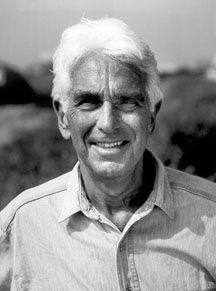Warren Bennis facts for kids
Quick facts for kids
Warren Bennis
|
|
|---|---|
 |
|
| Born |
Warren Gamaliel Bennis
March 8, 1925 |
| Died | July 31, 2014 (aged 89) |
| Occupation |
|
| Spouse(s) | Clurie Williams Bennis, (m. 1962, div. 1980), Grace Gabe (m. November 29, 1992) |
| Children | Katharine Bennis, John Leslie Bennis, Will Martin Bennis |
Warren Gamaliel Bennis (born March 8, 1925 – died July 31, 2014) was an American expert in leadership. He was a scholar, a consultant for organizations, and an author. Many people see him as a founder of the modern study of leadership.
Warren Bennis was a special professor at the University of Southern California. He also started The Leadership Institute there. His ideas helped change how organizations work. He believed in less strict, more democratic ways of leading.
James O'Toole, another expert, said that Bennis created a new field of study: leadership. In 1961, Bennis wrote about a "Revisionist Theory of Leadership." He showed that leaders who are kind and democratic are better at handling difficult and changing situations.
Early Life and Education
Warren Bennis was born in The Bronx, New York. He grew up in a working-class Jewish family in Westwood, New Jersey. In 1943, he joined the United States Army. He became one of the youngest officers in the Army during World War II in Europe. He received the Purple Heart and the Bronze Star for his service.
After the war, Bennis went to Antioch College in 1947. He earned his bachelor's degree there in 1951. In 1952, he received an Honors Certificate from the London School of Economics. He also became a Hicks Fellow at MIT.
At Antioch, Bennis met President Douglas McGregor. McGregor was a key figure in modern democratic management. He became Bennis's mentor. Later, both taught as professors at the MIT Sloan School of Management. Bennis earned his PhD from MIT in 1955. His main subjects were Social Sciences and Economics. At MIT, he led the Organizational Studies Department.
Warren Bennis's Career
In 1967, Bennis decided to use his ideas in real-world settings. He became the provost (a senior leader) at the State University of New York at Buffalo. In 1971, he became the president of the University of Cincinnati. During his time as president, he wrote two books about leadership: The Leaning Ivory Tower (1973) and The Unconscious Conspiracy: Why Leaders Can't Lead (1976).
After a heart attack in 1979, Bennis chose to return to teaching, consulting, and writing. He joined the faculty at the University of Southern California. Most of his 27 well-known books came out after this. These include the bestsellers Leaders and On Becoming A Leader. Both were translated into 21 languages. His book An Invented Life was even nominated for a Pulitzer Prize.
Some of his later books include Organizing Genius (1997), Co-Leaders (1999), and Managing The Dream (2000). These books focused on leadership, good judgment, how organizations change, and working together creatively. In Geeks & Geezers (2002), he looked at how leaders who are young (around 30) are similar to and different from older leaders (around 70). In 2002, he was welcomed into the Omicron Delta Kappa honor society at USC.
Bennis also advised four United States presidents. He consulted for many large companies listed in the FORTUNE 500. He taught at other universities like Harvard and Boston University. He also taught at the Indian Institute of Management Calcutta (IIM-C), INSEAD, and IMD. Besides his roles at USC, Bennis led the Advisory Board for the Center for Public Leadership at Harvard University's Kennedy School. He was also a visiting professor at the University of Exeter (UK) and a senior fellow at UCLA's School of Public Policy and Social Research.
His Impact on Leadership
Warren Bennis was highly respected for his work. In 1993, The Wall Street Journal named him one of the top ten most requested speakers on management. In 1996, Forbes magazine called him the "dean of leadership gurus." The Financial Times said in 2000 that he was "the professor who established leadership as a respectable academic field." In August 2007, Business Week ranked him among the top ten business thinkers.
His book On Becoming a Leader, first published in 1989, shared important ideas. It explained that a leader must be "authentic." This means a leader needs to be true to themselves, combining their experiences, self-knowledge, and personal values. This idea that effective leaders must be true to who they are later became known as the authentic leadership approach.
 | William L. Dawson |
 | W. E. B. Du Bois |
 | Harry Belafonte |

